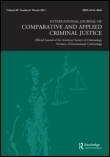
International Journal of Comparative and Applied Criminal Justice
Scope & Guideline
Fostering interdisciplinary connections in justice research.
Introduction
Aims and Scopes
- Comparative Criminal Justice Studies:
The journal emphasizes comparative analyses of criminal justice systems globally, examining how different countries approach crime prevention, policing, and legal processes. - Applied Research Methodologies:
It encourages the use of diverse methodologies, including qualitative, quantitative, and mixed methods, to explore practical implications of criminal justice policies and practices. - Victimology and Survivorship:
A significant focus is on the experiences and rights of victims, exploring their interactions with the criminal justice system and the impact of crime on their lives. - Police Practices and Community Relations:
The journal examines police practices, community engagement, and the dynamics of trust and legitimacy in law enforcement, reflecting on the societal implications of policing. - Social Justice and Equity:
It addresses issues of social justice, including gender, race, and economic disparities in the criminal justice system, advocating for equitable treatment and reform. - International Perspectives on Crime:
The journal covers international crime trends and the globalization of criminal behavior, emphasizing how local issues can have global implications.
Trending and Emerging
- Impact of Trauma on Victims:
There is a rising focus on the effects of trauma on victims, particularly in relation to terrorist acts and domestic violence, emphasizing the need for trauma-informed approaches in justice systems. - Restorative Justice Practices:
An increasing number of studies are exploring restorative justice initiatives, particularly in marginalized communities, highlighting their effectiveness in promoting healing and reconciliation. - Gender and Criminal Justice:
Research on gender issues, including the role of women in law enforcement and the experiences of female victims, is gaining traction, reflecting a broader discourse on gender equality in criminal justice. - Community Policing and Public Trust:
There is a notable trend towards examining the dynamics of community policing and the importance of fostering public trust in law enforcement, particularly in post-conflict societies. - Globalization of Crime:
Emerging studies are addressing the transnational nature of crime, including issues like human trafficking and organized crime, underscoring the need for international collaboration in crime prevention.
Declining or Waning
- Traditional Crime Theories:
There has been a noticeable shift away from classical theories of crime, such as strain theory and routine activity theory, with less emphasis on these frameworks in recent publications. - Focus on Deterrence Models:
Research focusing on deterrence as a primary method for crime prevention has decreased, indicating a move towards more rehabilitative and restorative justice approaches. - Punitive Justice Approaches:
Themes surrounding punitive justice measures, such as mandatory sentencing and three-strikes laws, are less frequently discussed, reflecting a broader critique of harsh sentencing policies. - Correlational Studies Without Contextual Analysis:
There is a declining interest in studies that solely rely on statistical correlations without exploring the contextual factors influencing criminal behavior. - Reactive Policing Strategies:
The exploration of reactive policing strategies, which focus on responding to crime after it occurs, is waning in favor of proactive and community-based approaches.
Similar Journals

Crime and Justice-A Review of Research
Transforming knowledge into action in crime studies.Crime and Justice: A Review of Research is a leading scholarly journal published by the University of Chicago Press, dedicated to advancing knowledge in the fields of sociology and political science, specifically through the lens of crime and justice studies. With an ISSN of 0192-3234 and an E-ISSN of 2153-0416, this academic journal offers a distinguished platform for researchers, practitioners, and students to explore contemporary issues, methodologies, and theoretical advancements within the domain. Ranked in the Q2 category for both sociology and political science as of 2023, it has gained recognition with an impressive Scopus rank of #150 out of 1466 in its field, placing it in the 89th percentile. The journal publishes comprehensive reviews and research articles that inform best practices and policies in crime prevention, law enforcement, and social justice, fostering a deeper understanding of the complexities surrounding crime and societal responses. Though it is not an open-access journal, the insightful research it presents is indispensable for academic discourse and practical application in addressing the multifaceted challenges of crime and justice in contemporary society.
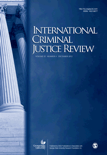
International Criminal Justice Review
Illuminating pathways in criminal justice scholarship.International Criminal Justice Review is a premier journal in the field of law, published by SAGE Publications Inc, renowned for its commitment to advancing the understanding of criminal justice issues on a global scale. With an ISSN of 1057-5677, this journal spans a rich history from its inception in 1991 to its ongoing contributions into 2024, supporting a diverse array of research that addresses both theoretical and practical concerns in international criminal law. The journal holds a prestigious Q1 ranking in the Law category for 2023, reflecting its influence and relevance, as evidenced by its impressive Scopus rank of #68 out of 1025 in the Social Sciences Law field, placing it in the 93rd percentile. Though not an open-access journal, it provides vital access options for institutions and individuals alike. International Criminal Justice Review serves as a critical resource for researchers, practitioners, and students dedicated to exploring the complexities of international criminal justice systems, offering a platform for innovative scholarship that informs policy and practice worldwide.
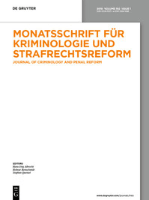
Monatsschrift fur Kriminologie und Strafrechtsreform
Transforming Perspectives on Law and Society.Monatsschrift für Kriminologie und Strafrechtsreform is a prestigious academic journal dedicated to advancing the fields of criminology and legal reform. Published by WALTER DE GRUYTER GMBH in Germany, this journal boasts a significant history since its inception in 1943, continually evolving its focus and scope from 2010 to 2024 to address contemporary issues in law and criminal justice. With an impressive Q2 rating in Law and a ranking in the 46th percentile among social sciences law journals, it serves as a vital resource for researchers, practitioners, and students alike. By publishing innovative articles, critical reviews, and comprehensive studies, the journal aims to foster academic discourse and propel discussions surrounding legislative reforms and criminological theories. Although it does not currently offer open access, readers can obtain valuable insights that contribute to both academic scholarship and practical applications in the legal field, thereby enhancing the understanding of complex societal dynamics related to crime and law enforcement.

Criminal Law Forum
Bridging theory and practice in criminal law scholarship.Criminal Law Forum, published by Springer, is a distinguished journal that serves as a critical platform for scholarly discourse in the field of criminal law. With an ISSN of 1046-8374 and E-ISSN 1572-9850, this journal has been contributing to the legal community since its inception, with a publication span that includes significant periods such as 1989 to 1997, and from 1999 to 2024. Positioned in the Q3 quartile of the Law category and ranked 491 out of 1025 in the Scopus database, Criminal Law Forum showcases innovative research, theoretical insights, and empirical studies that assist professionals, researchers, and students in dissection and comprehension of contemporary legal issues. Though it does not operate on an open-access model, the journal is accessible to subscribers and academic institutions, furthering its reach within the legal academia. By fostering a robust exchange of ideas and encouraging interdisciplinary approaches, Criminal Law Forum continues to enhance the understanding of criminal law, making it an essential resource for those engaged in legal scholarship.
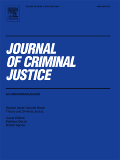
JOURNAL OF CRIMINAL JUSTICE
Elevating standards in interdisciplinary research.The JOURNAL OF CRIMINAL JUSTICE, published by Elsevier, stands at the forefront of interdisciplinary research at the nexus of law, psychology, and sociology. With an impressive impact factor and consistently ranking in the Q1 category across multiple disciplines, including Applied Psychology and Law, this journal serves as a vital platform for exploring critical issues in criminal justice policy, behavior, and system effectiveness. Since its inception in 1973, the journal has evolved its scope to encompass contemporary challenges and innovative responses within the field. Researchers, professionals, and students can benefit from access to high-quality, peer-reviewed articles that not only reflect current trends but also drive future discourse. Though currently not open access, the journal's rigorous standards ensure that all published works contribute significantly to advancing knowledge and practice in criminal justice and related areas.
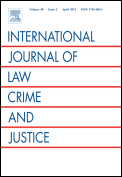
International Journal of Law Crime and Justice
Illuminating Contemporary Challenges in Law and CrimeThe International Journal of Law Crime and Justice, published by ELSEVIER SCI LTD, serves as a pivotal platform for the dissemination of cutting-edge research in the fields of law, crime, and justice. Established in 2008, the journal has established itself as a reputable source in its domain, holding a respectable Q2 ranking in Law, Political Science and International Relations, as well as Sociology and Political Science as of 2023. With an impact factor reflecting its influence, this journal ranks favorably within the top percentiles of Scopus in several social science categories, making it a critical resource for scholars and practitioners. The journal promotes open access, ensuring that vital research is accessible to a global audience. Scholars interested in the intricate intersection between legal studies, societal challenges, and crime will find the journal's objectives aligned with fostering knowledge and innovation in this dynamic field. Operating from its headquarters in London, England, the journal continues to invite substantial contributions that address contemporary issues and enhance our understanding of law and justice worldwide.

Journal of Experimental Criminology
Bridging Theory and Practice in Criminal JusticeThe Journal of Experimental Criminology, published by Springer, stands as a beacon of innovation within the realm of criminology and legal studies. With an ISSN of 1573-3750 and E-ISSN 1572-8315, this esteemed journal, based in the Netherlands, explores groundbreaking research and experimental approaches to understanding criminal behavior and justice systems. It proudly resides in the elite Q1 quartile of the law category for 2023, ranking an impressive #37 out of 1025 in Scopus within the Social Sciences _ Law domains, placing it in the 96th percentile among its peers. The journal's objectives are aimed at disseminating high-quality empirical research that informs policy and practice, making it an essential resource for scholars, practitioners, and students who strive to enhance the efficacy of crime prevention and criminal justice interventions. With coverage spanning from 2005 to 2024, the Journal of Experimental Criminology invites contributors from diverse backgrounds to engage in the interdisciplinary dialogue that shapes the future of criminological research.
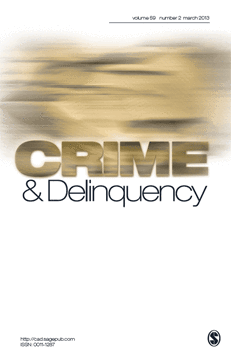
CRIME & DELINQUENCY
Connecting research with real-world implications.CRIME & DELINQUENCY, published by SAGE PUBLICATIONS INC, is a premier journal dedicated to advancing the study of criminology and criminal justice. With an esteemed ISSN of 0011-1287 and E-ISSN 1552-387X, this influential journal has been a vital resource since its inception in 1955, continuing to engage in rigorous research and discourse through to 2024. Recognized with a Q1 ranking in both Law and Pathology and Forensic Medicine, CRIME & DELINQUENCY boasts an impressive Scopus ranking, placing it in the top 8% of journals in Social Sciences - Law and the top 31% in Medicine - Pathology and Forensic Medicine. This journal serves as an essential forum for researchers, professionals, and students to explore pressing issues related to crime, delinquency, and their societal implications. Although not an open-access journal, it offers a valuable repository of insightful research and analysis that informs practices and policies within the field. To stay abreast of the latest findings and contribute to the ongoing discourse, CRIME & DELINQUENCY is a must-read for all committed to understanding and addressing criminal behavior in society.
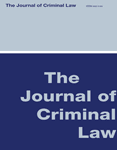
Journal of Criminal Law
Navigating Contemporary Challenges in JusticeWelcome to the Journal of Criminal Law, a prestigious publication in the field of legal studies, expertly published by SAGE Publications Ltd. With a rich history that dates back to 1937, this journal has been a vital platform for disseminating innovative research and critical analyses pertaining to criminal law and justice issues. The journal boasts a commendable Q2 ranking in the Law category for 2023, placing it among the top tier of legal publications. It is recognized for its impactful contributions, as indicated by its impressive Scopus Rank of #346 out of 1025 in the Social Sciences - Law category, positioning it within the 66th percentile. Although it does not currently offer open access options, researchers, professionals, and students will find a wealth of rigorously peer-reviewed articles that address contemporary challenges and developments in criminal law. Based in the United States, the journal is committed to fostering scholarly dialogue and advancing understanding in an ever-evolving legal landscape.

Trends and Issues in Crime and Criminal Justice
Exploring the forefront of criminological research.Trends and Issues in Crime and Criminal Justice is a leading journal in the field of criminology, published by the Australian Institute of Criminology. This esteemed journal, recognized with an H-index that reflects its influence and contribution to the social sciences, particularly law, spans from 2011 to 2024 and is ranked in the Q1 category within its discipline according to the 2023 data. With a Scopus ranking of #123 out of 1025 in the Social Sciences - Law category, placing it in the 88th percentile, it serves as a critical resource for researchers, practitioners, and students alike.
Focused on innovative research and emerging issues within crime and criminal justice, the journal seeks to foster scholarly collaboration and discourse, making it an essential hub for new ideas and evidence-based practices in the field. The journal’s commitment to advancing knowledge and influencing policy ensures that it remains an influential voice in criminological studies, aiming to address pressing issues facing societies globally.